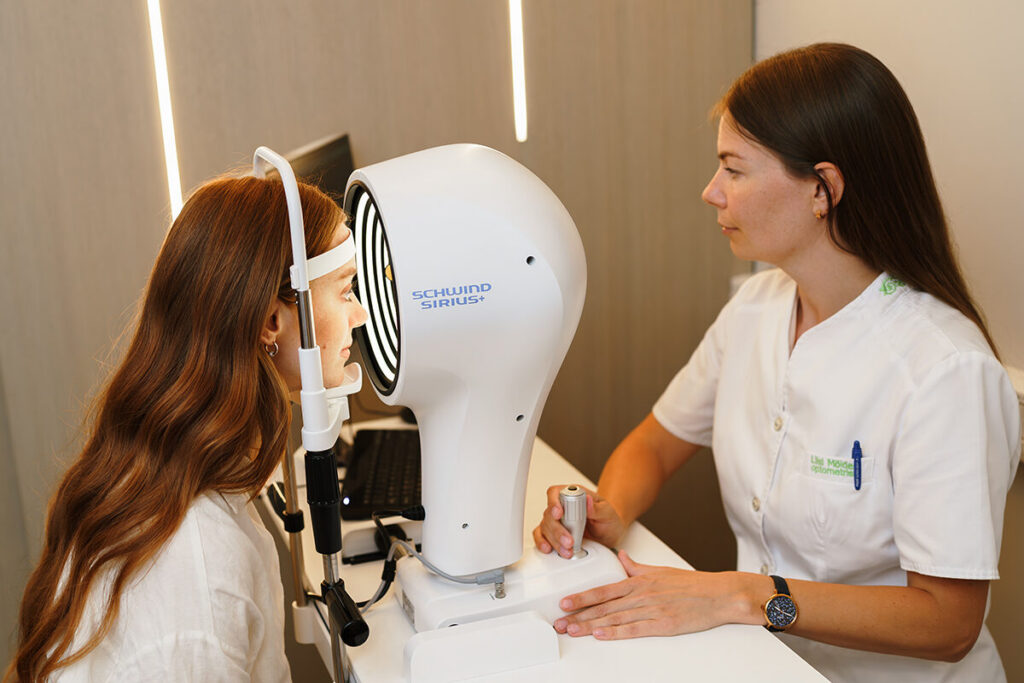5 surprising facts your eye doctor won’t tell you
There are many useful tips and truths about eye health and maintaining good vision that often don’t come up during a routine visit to the eye doctor.
Our everyday habits – even those that seem unrelated to our eyes – can have a significant impact on vision over time.
Below, we’ve gathered five surprising facts about eye health that can help you protect your eyesight and make more informed decisions about your vision care.
1. Wearing quality sunglasses helps protect your vision
Päikeseprillide kandmine pole ainult moeasi – see on oluline abivahend silmade parema tervise tagamisel. UV-kaitse aitab ennetada kahjustusi, mis võivad tekkida päikesekiirguse mõjul (näiteks võrkkesta kahjustus) ja vähendada riski haigestuda erinevatesse silmahaigustesse (näiteks katarakti või makuladegeneratsiooni). Tavalised päikeseprillid võivad küll vähendada valguse intensiivsust, kuid ainult UV-kaitsega päikeseprillid kaitsevad silmi kahjuliku kiirguse eest. Soovitatav on valida prillid, mis blokeerivad nii UVA- kui ka UVB-kiirgust. Vastavalt vajadusele võib neid kanda ka pilvise ilmaga, kuna UV-kiirgus tuleb läbi pilvede. Investeering kvaliteetsetesse UV-kaitsega päikeseprillidesse võib olla sinu nägemise jaoks hindamatu väärtusega!

2. Blue light glasses aren’t a miracle cure
In recent years, blue light glasses have become increasingly popular — but research shows that their benefits are limited.
They can provide some comfort, especially for people who spend long hours in front of screens, but they don’t replace other important habits for maintaining healthy eyes.
Make sure to take regular breaks while working on digital devices, adjust your screen brightness to suit your environment, and keep your eyes hydrated throughout the day.
It can also help to enable the blue light filter on your phone or computer in the evening to reduce strain.
Blue light glasses can be helpful, but good screen habits are still the best way to protect your eyes in the long run.
Although blue light glasses can help reduce eye strain caused by screens, they’re not a solution for all screen-related problems.
Spending long hours in front of bright screens can also affect your sleep, mood, and overall brain health.
Light exposure influences the production of melatonin, the hormone that regulates your sleep cycle.
When we spend late evenings staring at our phones or computers, it can disrupt our natural sleep rhythm and make it harder to fall asleep.
Constant exposure to blue light can also affect concentration, information processing, and overall cognitive function — especially in children and young people, whose brains are still developing.
Over time, excessive screen use can lead to reduced focus and mental fatigue, which makes it even more important to take regular breaks and limit screen time in the evenings.
3. Spending time outdoors can help slow down nearsightedness
Research shows that spending time outdoors — especially during childhood — can help slow down the progression of myopia (nearsightedness).
When we’re outside and focus on objects farther away, it helps train the eye muscles and support healthy visual development. This information is valuable not only for parents who want to support their children’s eye health, but also for adults.
While outdoor time may not significantly change vision in adulthood, it still helps maintain overall eye health —for example, by reducing eye strain caused by prolonged screen use. Eye doctors often encourage patients of all ages to take regular breaks and spend more time outside, as natural light and distance viewing benefit the eyes at every stage of life.
4. Long-term or improper use of eye drops can have negative effects
In the long run, using medicated eye drops continuously isn’t recommended, as it may signal an underlying issue that needs proper diagnosis and treatment.
Most eye drops are meant for short-term use to relieve specific symptoms — not as a permanent solution.
It’s also important to remember that eye drops don’t last forever. Over time, their active ingredients can break down, making them less effective or even harmful.
Additionally, the same drops might not work for future eye problems, since your eyes and their needs can change over time.
If you experience ongoing discomfort or dryness, it’s best to consult an eye specialist to find the right treatment instead of relying on drops long-term.
5. Regular eye exams can reveal other health problems
It’s recommended to have an eye exam at least once a year. This is especially important for people who wear glasses or contact lenses, but regular check-ups also help monitor other common eye issues like dry eyes or high eye pressure.
Even if your vision seems clear and stable, it’s still essential to have your eyes examined regularly.
Many people don’t realize that eye exams can also play a key role in detecting broader health conditions, such as diabetes, high blood pressure, and other systemic diseases.
Your eyes can tell a lot about your overall health — and regular check-ups help ensure that any issues are caught early.





